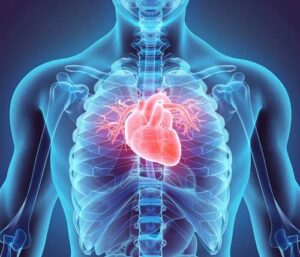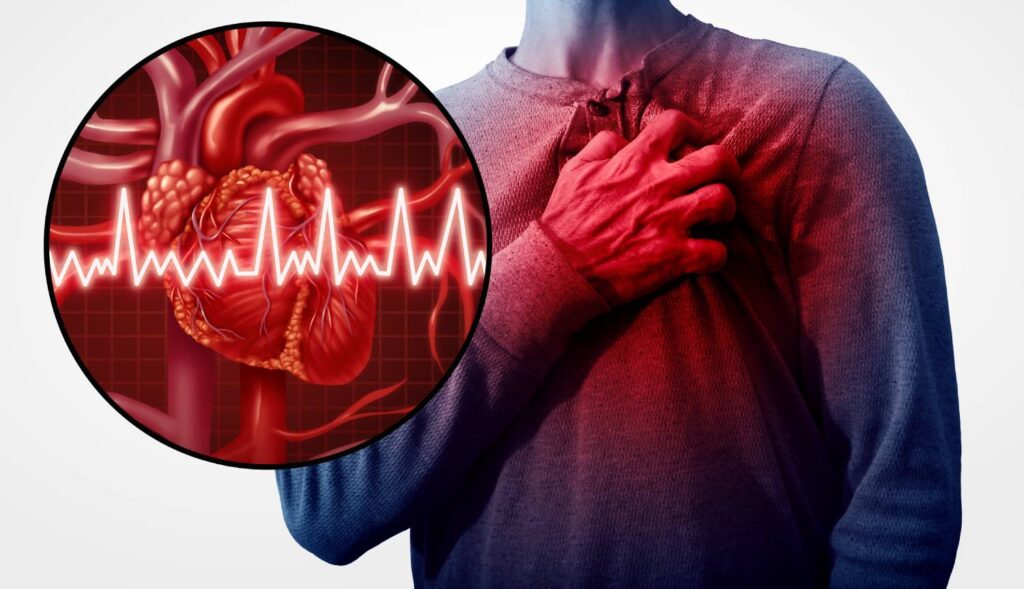Blood Pressure and Heart Problems, is one of the leading causes of heart-related issues, yet many people live with it without even realizing. It’s often called the silent killer because it doesn’t always show symptoms, but over time, it can damage your heart and blood vessels, increasing your risk of serious conditions like heart attacks, heart disease, and even stroke.
In this blog, we’ll explain how high blood pressure affects your heart. You’ll learn why it raises your risk of a heart attack. We’ll also share simple steps to lower your blood pressure and protect your heart health.
Contents
What is High Blood Pressure (Hypertension)?
 High blood pressure, also known as hypertension and heart disease, occurs when the force of the blood against the walls of your arteries is consistently too high. Blood pressure is measured using two numbers: systolic (the pressure when your heart beats) and diastolic (the pressure when your heart rests between beats).
High blood pressure, also known as hypertension and heart disease, occurs when the force of the blood against the walls of your arteries is consistently too high. Blood pressure is measured using two numbers: systolic (the pressure when your heart beats) and diastolic (the pressure when your heart rests between beats).
A normal blood pressure reading is typically 120/80 mm Hg. When the reading consistently rises above 130/80 mm Hg, it is considered high blood pressure.
How It Develops
Hypertension develops over time due to a variety of factors, including poor diet, lack of exercise, stress, smoking, or genetics. High blood pressure is often called the “silent killer” because it typically has no noticeable symptoms. You might not even know you have high blood pressure until it causes significant damage. Over time, increased pressure strains your heart and blood vessels. This can cause them to weaken, narrow, or stiffen. This can lead to serious health problems, including heart disease, stroke, and kidney damage.
How Does High Blood Pressure Affect the Heart?
High blood pressure puts an enormous amount of pressure on your heart and blood vessels, causing both short-term and long-term problems. Here’s how it impacts the heart:
- It can strain the heart
- Damage blood vessels
- Increases the risk of heart attack and heart failure
Prolonged high blood pressure not only forces your heart to work harder but also accelerates the process of vascular damage, significantly increasing the risk of life-threatening conditions like heart attacks and heart failure. Monitoring and managing your blood pressure to protect your heart is essential.
How Does High Blood Pressure Cause a Heart Attack?

Yes, high blood pressure can increase the risk of a heart attack. Here’s how:
- Damaged Arteries: Over time, high blood pressure causes the arteries to narrow and harden, reducing blood flow to the heart. This makes it harder for oxygen-rich blood to reach the heart muscle.
- Plague Buildup: The pressure also damages the inner walls of the arteries, leading to the accumulation of plaque (fatty deposits). This plaque can eventually rupture, causing a blood clot to form, which can block blood flow completely and trigger a heart attack.
The Role of Blood Pressure in Stroke Risk
High blood pressure and heart problems, is a leading risk factor for stroke. When blood pressure is consistently high, it causes damage to the arteries, including those in the brain, making them narrower and weaker. This process, known as atherosclerosis, restricts blood flow, reducing the oxygen and nutrients the brain receives. As a result, the brain is more vulnerable to damage.
Additionally, high blood pressure increases the likelihood of blood clots forming in the arteries. These clots can travel to the brain and block blood flow, leading to an ischemic stroke.
In more severe cases, chronic hypertension can cause blood vessels in the brain to weaken and burst, leading to a hemorrhagic stroke. This type of stroke occurs when bleeding in the brain damages the surrounding tissue, and it can be fatal.
In short, managing your blood pressure is crucial for reducing the risk of stroke. Regular monitoring, healthy lifestyle choices, and medication can all help lower your risk and protect your brain health.
How High BP Leads to Heart Disease
High blood pressure plays a significant role in the development of atherosclerosis (hardening of the arteries), which is a key factor in many heart diseases. Here’s how it works:
-
Atherosclerosis: When blood pressure is high, it damages the inner walls of the arteries, causing them to become thickened and narrowed over time. This creates an environment where plaque (fatty deposits) can build up, further narrowing the arteries. As the arteries harden, it becomes harder for blood to flow smoothly, leading to reduced oxygen supply to the heart and other organs.
-
Coronary Artery Disease: The coronary arteries, which supply blood to the heart, are particularly vulnerable. As the arteries become narrower, it increases the risk of coronary artery disease. This condition reduces the flow of blood to the heart, causing chest pain, shortness of breath, and increasing the risk of heart attack.
-
Heart Failure: Over time, high blood pressure puts extra strain on the heart. This added effort can lead to heart failure. The heart must work harder to pump blood through narrowed, stiff arteries. Eventually, this weakens the heart and reduces its ability to pump blood efficiently.
How Can I Drop Blood Pressure Quickly to Protect My Heart?

If you’re experiencing high blood pressure and need to lower it quickly, here are some effective strategies you can try to help protect your heart:
- Relax and Practice Deep Breathing: Take 5-10 minutes to practice deep breathing or meditation to help calm your body and reduce stress.
- Drink Water: Stay hydrated by drinking plenty of water throughout the day, as dehydration can cause a spike in blood pressure.
- Take a Walk: Engage in light exercise, like going for a brisk walk. This can help improve blood flow and lower blood pressure.
- Reduce Salt Intake: Cut back on sodium by avoiding processed foods, canned soups, and fast food. This can help lower blood pressure over time.
- Limit Caffeine and Alcohol: Avoid caffeine and alcohol, as both can temporarily raise your blood pressure.
- Relax in a Quiet Place: Find a calm, quiet space to sit and relax. Reducing stress is key to keeping blood pressure in check.
- Take Prescribed Medication: Follow your doctor’s instructions and take any prescribed blood pressure medications as directed.
While these steps can help lower blood pressure quickly, it’s important to make long-term lifestyle changes for sustained heart health. Always consult with your healthcare provider for personalized guidance.
Conclusion
High blood pressure is a serious condition that can lead to severe heart problems, including heart attacks, heart failure, and strokes. Managing your blood pressure is crucial to protecting your heart and overall health.
If you’re experiencing any heart-related issues or want to ensure your heart stays healthy, it’s essential to consult a cardiologist. At MantraDoc, we offer online consultations with licensed cardiologists who can help diagnose and treat heart diseases, hypertension, arrhythmias, and more.
Click the button below and get connected with an expert cardiologist today!

